人教PEP版英语小升初专项复习 动词分类汇总 附练习题(无答案)
文档属性
| 名称 | 人教PEP版英语小升初专项复习 动词分类汇总 附练习题(无答案) |
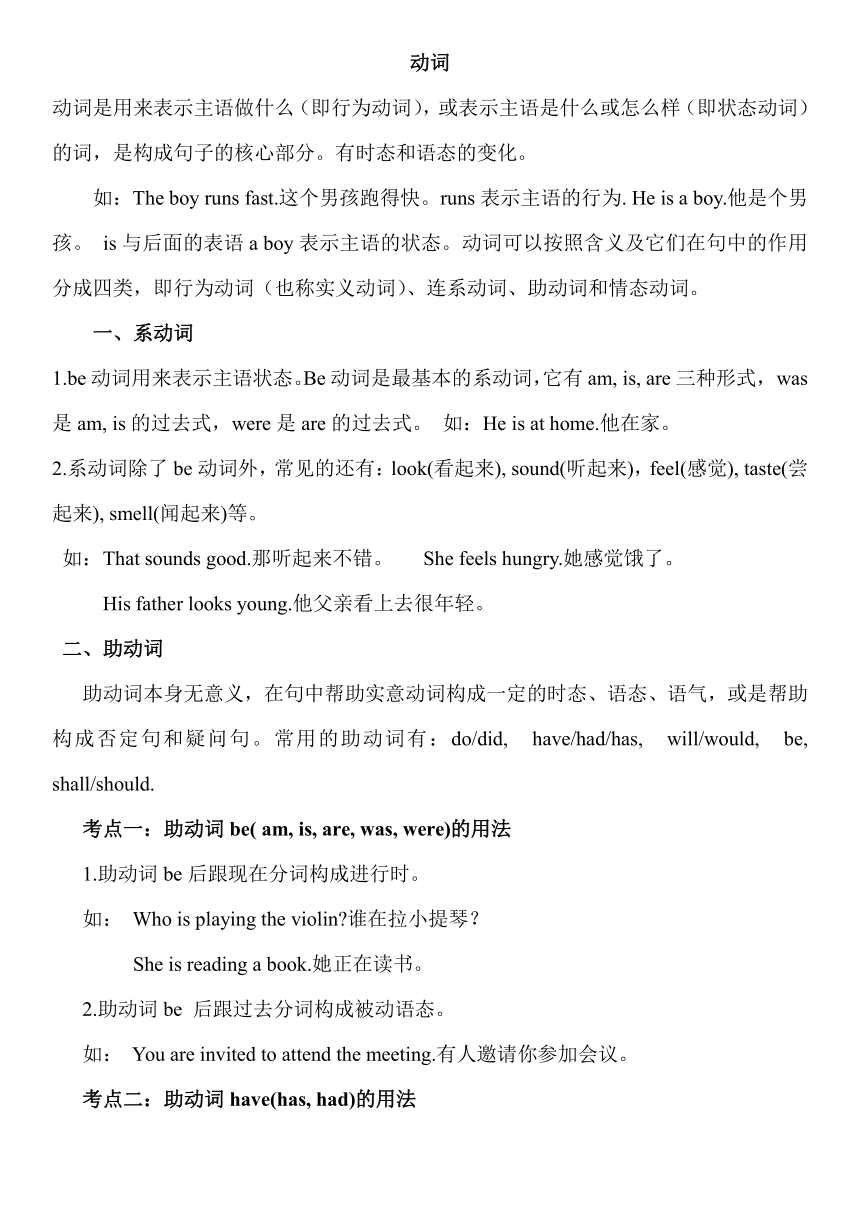
|
|
| 格式 | docx | ||
| 文件大小 | 34.1KB | ||
| 资源类型 | 教案 | ||
| 版本资源 | 人教版(PEP) | ||
| 科目 | 英语 | ||
| 更新时间 | 2024-04-22 00:00:00 | ||
图片预览

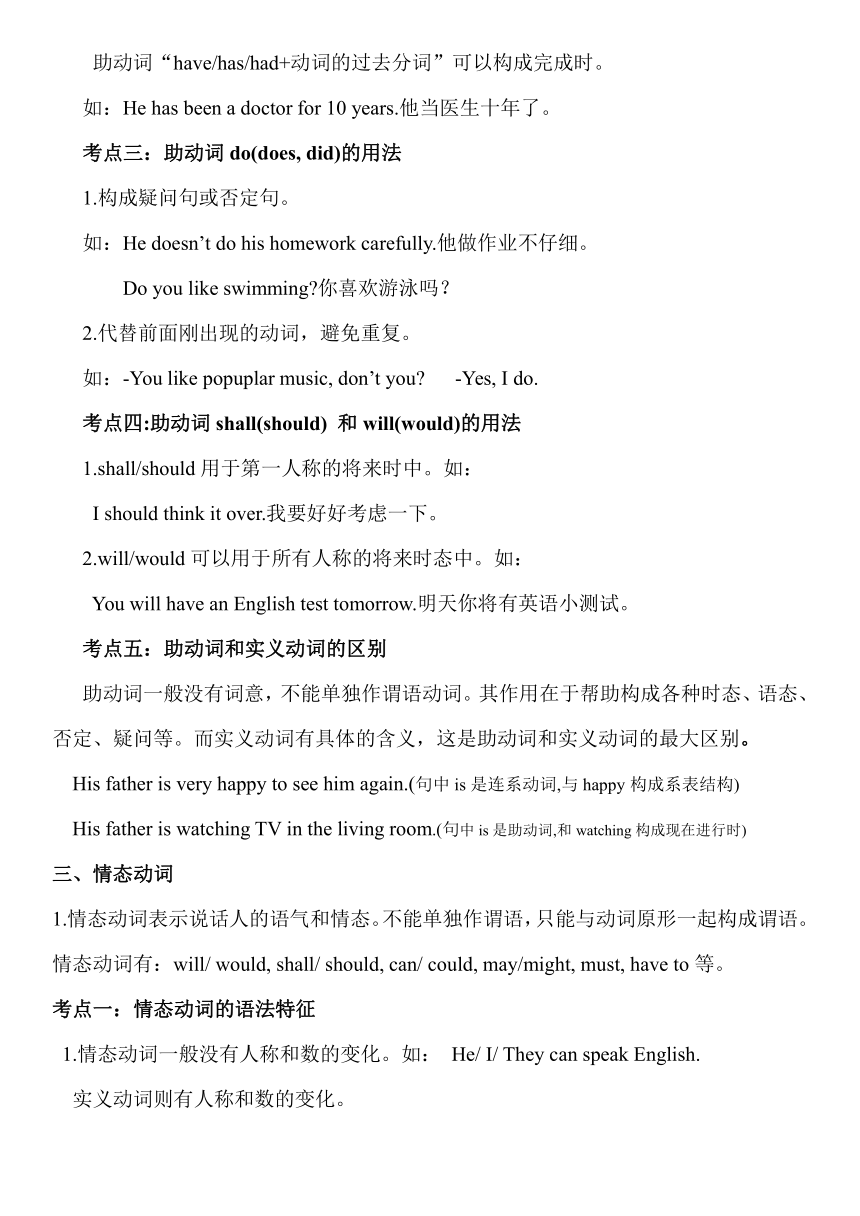
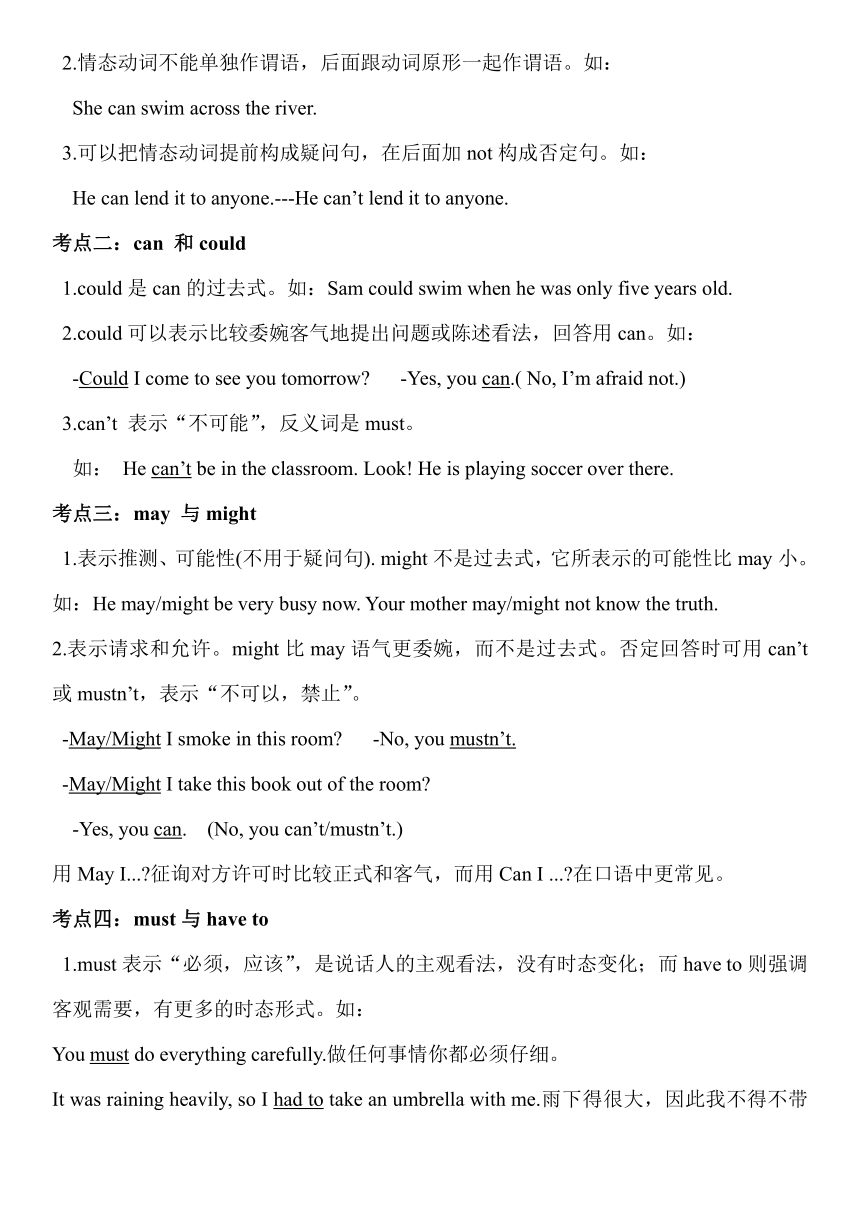
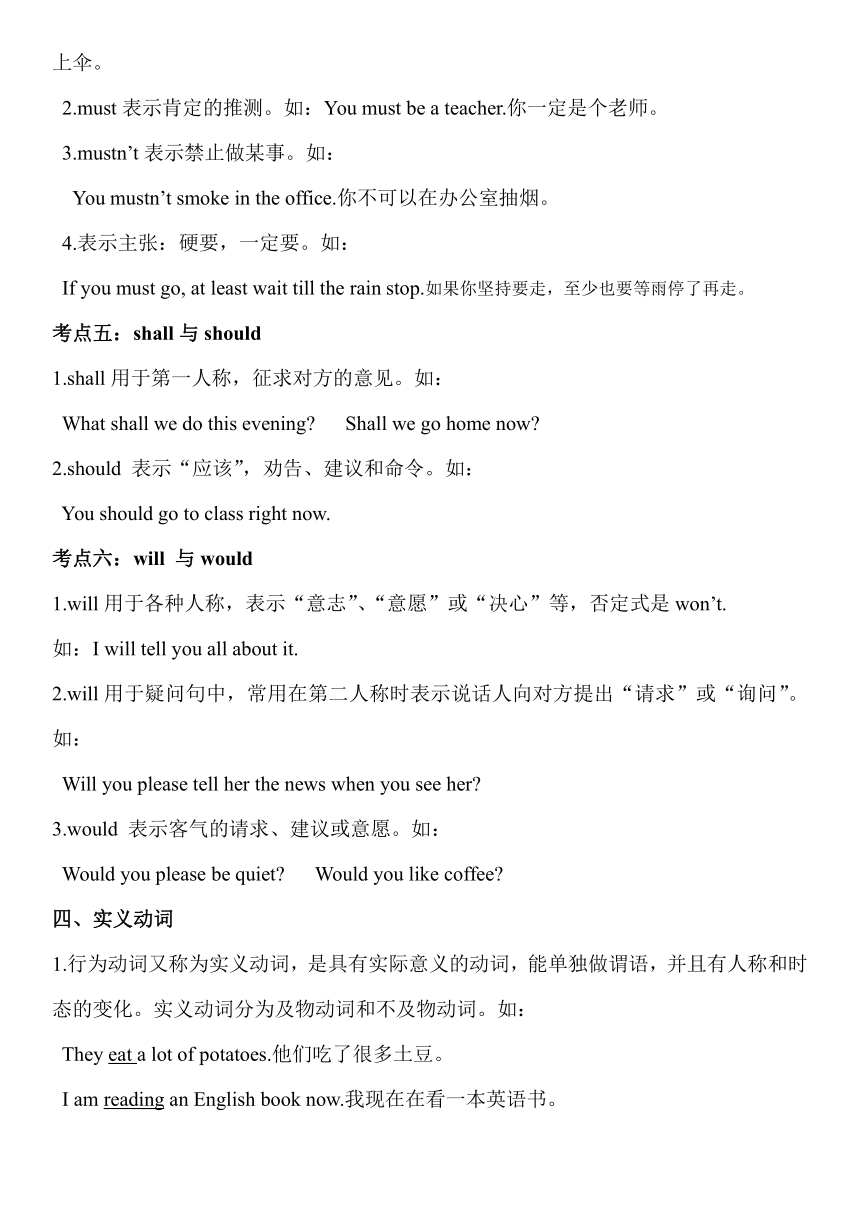
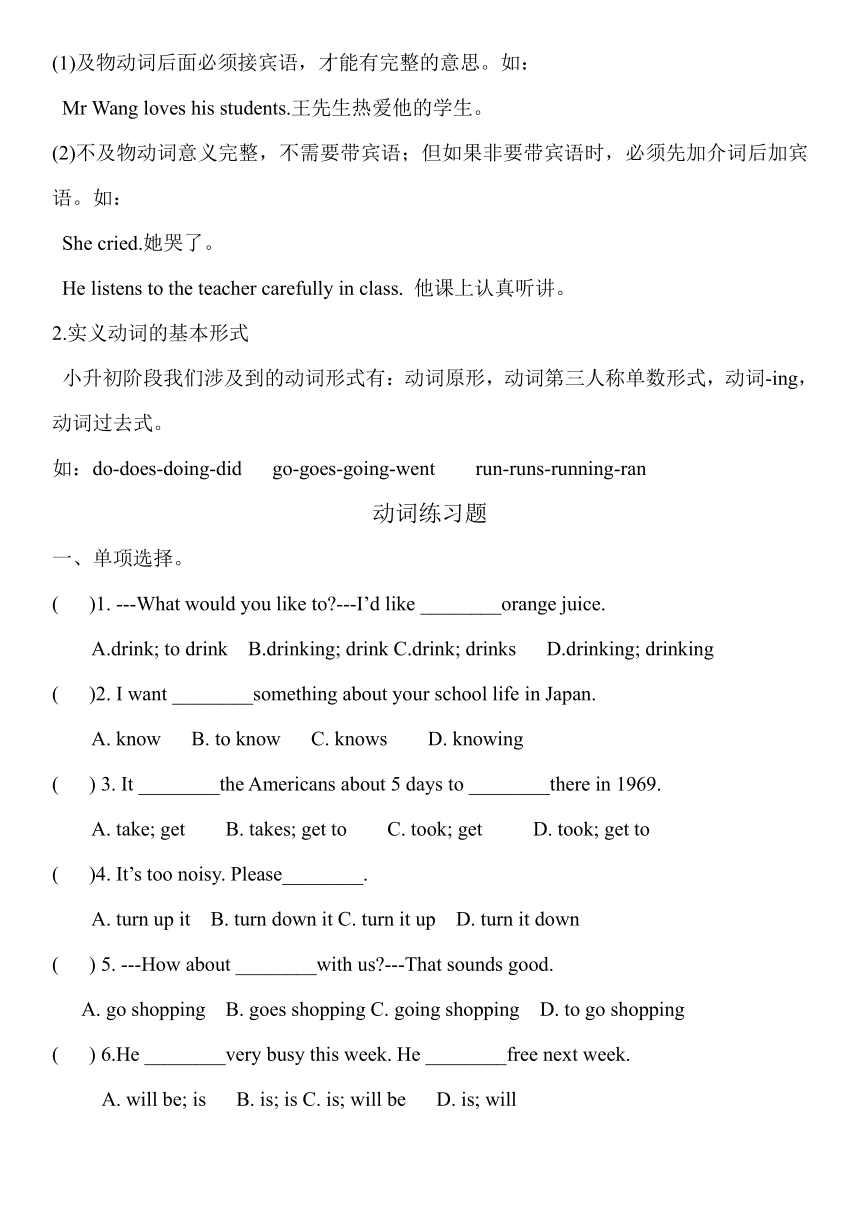
文档简介
动词
动词是用来表示主语做什么(即行为动词),或表示主语是什么或怎么样(即状态动词)的词,是构成句子的核心部分。有时态和语态的变化。
如:The boy runs fast.这个男孩跑得快。runs表示主语的行为. He is a boy.他是个男孩。 is与后面的表语a boy表示主语的状态。动词可以按照含义及它们在句中的作用分成四类,即行为动词(也称实义动词)、连系动词、助动词和情态动词。
系动词
1.be动词用来表示主语状态。Be动词是最基本的系动词,它有am, is, are三种形式, was是am, is的过去式,were是are的过去式。 如:He is at home.他在家。
2.系动词除了be动词外,常见的还有:look(看起来), sound(听起来),feel(感觉), taste(尝起来), smell(闻起来)等。
如:That sounds good.那听起来不错。 She feels hungry.她感觉饿了。
His father looks young.他父亲看上去很年轻。
二、助动词
助动词本身无意义,在句中帮助实意动词构成一定的时态、语态、语气,或是帮助构成否定句和疑问句。常用的助动词有:do/did, have/had/has, will/would, be, shall/should.
考点一:助动词be( am, is, are, was, were)的用法
1.助动词be后跟现在分词构成进行时。
如: Who is playing the violin 谁在拉小提琴?
She is reading a book.她正在读书。
2.助动词be 后跟过去分词构成被动语态。
如: You are invited to attend the meeting.有人邀请你参加会议。
考点二:助动词have(has, had)的用法
助动词“have/has/had+动词的过去分词”可以构成完成时。
如:He has been a doctor for 10 years.他当医生十年了。
考点三:助动词do(does, did)的用法
1.构成疑问句或否定句。
如:He doesn’t do his homework carefully.他做作业不仔细。
Do you like swimming 你喜欢游泳吗?
2.代替前面刚出现的动词,避免重复。
如:-You like popuplar music, don’t you -Yes, I do.
考点四:助动词shall(should) 和will(would)的用法
1.shall/should用于第一人称的将来时中。如:
I should think it over.我要好好考虑一下。
2.will/would可以用于所有人称的将来时态中。如:
You will have an English test tomorrow.明天你将有英语小测试。
考点五:助动词和实义动词的区别
助动词一般没有词意,不能单独作谓语动词。其作用在于帮助构成各种时态、语态、否定、疑问等。而实义动词有具体的含义,这是助动词和实义动词的最大区别。
His father is very happy to see him again.(句中is是连系动词,与happy构成系表结构)
His father is watching TV in the living room.(句中is是助动词,和watching构成现在进行时)
三、情态动词
1.情态动词表示说话人的语气和情态。不能单独作谓语,只能与动词原形一起构成谓语。情态动词有:will/ would, shall/ should, can/ could, may/might, must, have to等。
考点一:情态动词的语法特征
1.情态动词一般没有人称和数的变化。如: He/ I/ They can speak English.
实义动词则有人称和数的变化。
2.情态动词不能单独作谓语,后面跟动词原形一起作谓语。如:
She can swim across the river.
3.可以把情态动词提前构成疑问句,在后面加not构成否定句。如:
He can lend it to anyone.---He can’t lend it to anyone.
考点二:can 和could
1.could是can的过去式。如:Sam could swim when he was only five years old.
2.could可以表示比较委婉客气地提出问题或陈述看法,回答用can。如:
-Could I come to see you tomorrow -Yes, you can.( No, I’m afraid not.)
3.can’t 表示“不可能”,反义词是must。
如: He can’t be in the classroom. Look! He is playing soccer over there.
考点三:may 与might
1.表示推测、可能性(不用于疑问句). might不是过去式,它所表示的可能性比may小。
如:He may/might be very busy now. Your mother may/might not know the truth.
表示请求和允许。might比may语气更委婉,而不是过去式。否定回答时可用can’t或mustn’t,表示“不可以,禁止”。
-May/Might I smoke in this room -No, you mustn’t.
-May/Might I take this book out of the room
-Yes, you can. (No, you can’t/mustn’t.)
用May I... 征询对方许可时比较正式和客气,而用Can I ... 在口语中更常见。
考点四:must与have to
1.must表示“必须,应该”,是说话人的主观看法,没有时态变化;而have to则强调客观需要,有更多的时态形式。如:
You must do everything carefully.做任何事情你都必须仔细。
It was raining heavily, so I had to take an umbrella with me.雨下得很大,因此我不得不带上伞。
2.must表示肯定的推测。如:You must be a teacher.你一定是个老师。
3.mustn’t表示禁止做某事。如:
You mustn’t smoke in the office.你不可以在办公室抽烟。
4.表示主张:硬要,一定要。如:
If you must go, at least wait till the rain stop.如果你坚持要走,至少也要等雨停了再走。
考点五:shall与should
shall用于第一人称,征求对方的意见。如:
What shall we do this evening Shall we go home now
should 表示“应该”,劝告、建议和命令。如:
You should go to class right now.
考点六:will 与would
will用于各种人称,表示“意志”、“意愿”或“决心”等,否定式是won’t.
如:I will tell you all about it.
will用于疑问句中,常用在第二人称时表示说话人向对方提出“请求”或“询问”。如:
Will you please tell her the news when you see her
would 表示客气的请求、建议或意愿。如:
Would you please be quiet Would you like coffee
实义动词
1.行为动词又称为实义动词,是具有实际意义的动词,能单独做谓语,并且有人称和时态的变化。实义动词分为及物动词和不及物动词。如:
They eat a lot of potatoes.他们吃了很多土豆。
I am reading an English book now.我现在在看一本英语书。
及物动词后面必须接宾语,才能有完整的意思。如:
Mr Wang loves his students.王先生热爱他的学生。
不及物动词意义完整,不需要带宾语;但如果非要带宾语时,必须先加介词后加宾语。如:
She cried.她哭了。
He listens to the teacher carefully in class. 他课上认真听讲。
实义动词的基本形式
小升初阶段我们涉及到的动词形式有:动词原形,动词第三人称单数形式,动词-ing,动词过去式。
如:do-does-doing-did go-goes-going-went run-runs-running-ran
动词练习题
单项选择。
( )1. ---What would you like to ---I’d like ________orange juice.
A.drink; to drink B.drinking; drink C.drink; drinks D.drinking; drinking
( )2. I want ________something about your school life in Japan.
A. know B. to know C. knows D. knowing
( ) 3. It ________the Americans about 5 days to ________there in 1969.
A. take; get B. takes; get to C. took; get D. took; get to
( )4. It’s too noisy. Please________.
A. turn up it B. turn down it C. turn it up D. turn it down
( ) 5. ---How about ________with us ---That sounds good.
A. go shopping B. goes shopping C. going shopping D. to go shopping
( ) 6.He ________very busy this week. He ________free next week.
A. will be; is B. is; is C. is; will be D. is; will
( )7. You must ________your mum’s room warm, Susan.
A. have B. to have C. keep D. to keep
( )8.The boy next to us ________watching football match very much.
A. enjoy B. enjoys C. to enjoy D. enjoying
( ) 9.He likes________the radio.
A. listens B. to listen to C. listen to D. to listen
( ) 10. ---What did you do last night ---I did my homework and ________TV.
A. watch B. watched C. will watch D. am watching
( )11.--you like the new film --No, I did not. I________like it at all.
A. Did; did B. Are; don’t C. Did; didn’t D. Were; did not
( )12.What________you usually do on Sundays A. do B. does C. did D. are
( )13.The film is going to begin. Please don’t .
A. talk B. say C. talking D. to talk
( )14.--Where________your father from ---Beijing.
A. are B. is C. do D. does
( )15.Linda________pictures very much.
A. like drawing B. like to drawing C. like draw D. likes drawing
( )16.--your brother know the traffic rules --Yes, he.
A. Does; does B. Do; do C. Is; does D. Has; has
( )17.He________very busy this week. He ________free next week.
A. will be; is B. is; is C. is; will be D. is; will
( )18.You must________your mum’s room warm, Susan.
A. have B. to have C. keep D. to keep
( )19. John was ill last night so his mother________the doctor.
A. calls B. calling C. to call D. called
( )20.I usually________at nine thirty at night.
A. get to school B. get up C. go to bed D. go home
( )21.My brother the morning TV every day.
A. watches B. watch C. watchs D. see
( )22. I ________a kite and________it on the wall yesterday.
A. maked; puted B. made; put C. made; puted
( )23.Last Friday, they________a ________race.
A. had; running B. have; running C. had; running
( )24.---Where________he from ---He________from China.
A. is; come B. is; comes C. does; is
( )25.The doctor often tells him________more exercise.
A. to take B. taking C. taken D. take
( )26.Tom likes maths very much. Look! He________a question in the math class now.
A. asks B. is asking C. is going to ask
( )27.My brother________free tomorrow.A. will is B. is C. will be D. is being
( )28.Can you________my best friend A. be B. are C. is be
( )29.The businessmen often________to other.
A. goes; countries B. go; countries C. go; country
( )30. My sister________a taxi driver.A. is B. does C. do
( )31.Zhang Peng cleaned his room and________clothes on Sunday.
A. to wash B. wash C. washed D. washes
( )32.________your kite high in the sky!A. Put B. Let C. Fly
( )33.Cindy________her dog for a walk in the park every day.
A. take B. takes C. is taking D. took
( )34. Please________the TV a little. Father is sleeping.
A. turn off B. turn on C. turn down D. turn up
( )35.He wants____basketball today,but his mother wants himat home.
A. playing; to stay B. to plays; to stay C. to play; to stay D. playing; staying
( )36.---Can you________Chinese
---No, but I often________with my friends English.
A. tell; say; at B. speak; talk; in C. speak; tell; in
( )37.Look, the coats are on the floor. Can you________
A. pick them up B. pick up it C. pick up them
( )38.He is________to Ben about their school field trip.
A. talk B. talks C. talking
( )39. If you can’t________English, you can’t ________in Chinese.
A. speak; speak B. say; speak C. speak; say D. say; say
( )40. ---Whoa dog in my class ---Many students.
A. have; has B. has; has C. has; have D. have; have
( )41.Look! The cat is.A. walk B. run C. ran D. running
( )42.Li Lei________his bedroom now.A. clean B. cleans C. is cleaning
( )43.She will________a magazine about animals after school.
A. buys B. buy C. is buying D. going to buy
( )44.Everyone________get birthday cards.
A. like to B. like C. likes to D. is liking
( )45.Drivers ________on the side of the road in America.
A. drive; left B. drives; left C. drives; right D. drive; right
( )46.Jim has a sore throat. He should________hot tea ________honey.
A. drinks; with B. to drink; with C. drink; has D. drink; right
( )47.Let’s________to the cinema.A. go B. going C. goes D. to go
( )48.She________in China.A. lives B. live C. living D. living is
( )49. How__he___to school
A. do; get B. does; gets C. do; gets D. does; get
( )50.You are ill. You should________a doctor. A. look B. watch C. see
( )51.John________dancing. A. like B. likes C. liking
( )52.---How________he go to school --- He________to school by bus.
A. does; goes B. does; go C. do; goes
( )53.There are so many people in the shop. You must________your things.
A. look at B. look after C. put away D. put on
( )54.What________Amy________at weekends
A. do; does B. does; do C. did; do D. is; do
( )55. Let’s________together.
A. watch TV B. watches TV C. watching TV D. to watch TV
( )56.A: What________you________ do today, Nancy
B: I’m going to see a movie with my family.
A. do; going to B. are; going to C. do; to D. are; want
( )57.Mrs. Smith can ________piano.
A. played the B. played C. plays the D. play the
( )58.________like to join us A. Can you B. You would C. Do you D. Would you
( )59.How can I ________the cinema A. get off B. get C. get to
( )60.My shoes________under the bed just now. But they________there now.
A. are; weren’t B. were; weren’t C. were; aren’t
( )61. A:________I use the telephone B: Yes, please.
A. May B. Do C. Shall
( )62.Is that Billy________ A. speak B. speaking C. speaks
( )63.She________to Tibet two years ago.A. come B. comes C. came
( )64.Shea black pen. She doesn’t________a red pen.
A. have; has B. has; have C. have; have D. has; has
( )65.Seven and eight________fifteen. A. are B. be C. am D. is
( )66.your parents________at school
A. Do; works B. Does; work C. Do; work
( )67.In our school, school ________at 7:30. A. is B. start C. starts D. does
( )68.He doesn’t have any bananas. He only ________apples.
A. bring B. have C. need D. eats
( )69.---What does it mean ---It means you couldn’t________.
A. smoking B. smoken C. smoke
( )70.________your new clothes. It’s time to clean the classroom.
A. Put on B. Put in C. Take on D. Take off
( )71.My father ________English now.A. reads B. reading C. is reading D. read
( )72. She ________to school at 7:40 every day, but yesterday she to school at 7:00.
A. goes; goes B. Does; has C. Does; have
二、用动词的适当形式填空。
(1)He________( be ) a teacher.(2)That________( sound ) good.
(3)He can________( play ) the piano.(4)( do ) ________you know Kelly
三、选择正确的单词补全下列短语。
A. watch B. listen C. have D. takeE. speak
F. play G. pick H. driveI. visit J. wash
1.________basketball 2.________English 3.________lunch
4.________TV 5.________the clothes 6.________to the radio
7.________a train 8.________flowers 9.________the museum
10. ________a car
四、请从括号里圈出正确的动词形式。
(1) He ________( am / is / are ) from America. He and I ________( am / is / are ) friends.
(2) That cat________ ( am / is / are ) fat and lazy.
(3) ________( Do / Does ) Tom study in Shiyan Primary School
(4) We ________( don’t / doesn’t / didn’t ) have classes on Friday afternoon.
(5) There________ ( be / is / are ) a new bookstore nearby.
(6) It ________( get / gets / got ) hotter and hotter.
(7) The soup________ ( smell / smells ) delicious.
(8) ________( Look / Looking )! A bird________ ( am / is / are ) flying.
(9) They are ______( sits / sitting ) in the room and Andy is ______( runs / running ) outside.
(10) The big house________ ( have / has ) six windows.
五、找出错误并改正。
( ) 1.He writes a letter last night.
A B C D
( ) 2.Jenny is listen to music now. _____________
A B C D
( ) 3.Wang Bin like PE very much. ____________
A B C D
( ) 4.What does your uncle often has for breakfast __________
A B C
( ) 5.Linda like playing chess after class. _________
A B C D
六、用括号中动词的适当形式填空。
My name is Susan. I am a middle school student. I don’t (1)________(have) any
brothers. But I (2)________(have) two sisters. We (3) ________(be) in the same middle
school. I (4)________( go ) to school with them every day. I am 15 years old now and
yesterday (5)________(be) my birthday. While I was watching TV in my room at ten
last morning, my parents (6)________(come)back and (7)________(give) me a big surprise.
It is a lovely Teddy Bear. I like the gift very much. I love my parents and I (8)________
(study) harder than before. I (9)________( be ) 16 years old next year and (10)________
(want) to be a doctor in the future.
动词是用来表示主语做什么(即行为动词),或表示主语是什么或怎么样(即状态动词)的词,是构成句子的核心部分。有时态和语态的变化。
如:The boy runs fast.这个男孩跑得快。runs表示主语的行为. He is a boy.他是个男孩。 is与后面的表语a boy表示主语的状态。动词可以按照含义及它们在句中的作用分成四类,即行为动词(也称实义动词)、连系动词、助动词和情态动词。
系动词
1.be动词用来表示主语状态。Be动词是最基本的系动词,它有am, is, are三种形式, was是am, is的过去式,were是are的过去式。 如:He is at home.他在家。
2.系动词除了be动词外,常见的还有:look(看起来), sound(听起来),feel(感觉), taste(尝起来), smell(闻起来)等。
如:That sounds good.那听起来不错。 She feels hungry.她感觉饿了。
His father looks young.他父亲看上去很年轻。
二、助动词
助动词本身无意义,在句中帮助实意动词构成一定的时态、语态、语气,或是帮助构成否定句和疑问句。常用的助动词有:do/did, have/had/has, will/would, be, shall/should.
考点一:助动词be( am, is, are, was, were)的用法
1.助动词be后跟现在分词构成进行时。
如: Who is playing the violin 谁在拉小提琴?
She is reading a book.她正在读书。
2.助动词be 后跟过去分词构成被动语态。
如: You are invited to attend the meeting.有人邀请你参加会议。
考点二:助动词have(has, had)的用法
助动词“have/has/had+动词的过去分词”可以构成完成时。
如:He has been a doctor for 10 years.他当医生十年了。
考点三:助动词do(does, did)的用法
1.构成疑问句或否定句。
如:He doesn’t do his homework carefully.他做作业不仔细。
Do you like swimming 你喜欢游泳吗?
2.代替前面刚出现的动词,避免重复。
如:-You like popuplar music, don’t you -Yes, I do.
考点四:助动词shall(should) 和will(would)的用法
1.shall/should用于第一人称的将来时中。如:
I should think it over.我要好好考虑一下。
2.will/would可以用于所有人称的将来时态中。如:
You will have an English test tomorrow.明天你将有英语小测试。
考点五:助动词和实义动词的区别
助动词一般没有词意,不能单独作谓语动词。其作用在于帮助构成各种时态、语态、否定、疑问等。而实义动词有具体的含义,这是助动词和实义动词的最大区别。
His father is very happy to see him again.(句中is是连系动词,与happy构成系表结构)
His father is watching TV in the living room.(句中is是助动词,和watching构成现在进行时)
三、情态动词
1.情态动词表示说话人的语气和情态。不能单独作谓语,只能与动词原形一起构成谓语。情态动词有:will/ would, shall/ should, can/ could, may/might, must, have to等。
考点一:情态动词的语法特征
1.情态动词一般没有人称和数的变化。如: He/ I/ They can speak English.
实义动词则有人称和数的变化。
2.情态动词不能单独作谓语,后面跟动词原形一起作谓语。如:
She can swim across the river.
3.可以把情态动词提前构成疑问句,在后面加not构成否定句。如:
He can lend it to anyone.---He can’t lend it to anyone.
考点二:can 和could
1.could是can的过去式。如:Sam could swim when he was only five years old.
2.could可以表示比较委婉客气地提出问题或陈述看法,回答用can。如:
-Could I come to see you tomorrow -Yes, you can.( No, I’m afraid not.)
3.can’t 表示“不可能”,反义词是must。
如: He can’t be in the classroom. Look! He is playing soccer over there.
考点三:may 与might
1.表示推测、可能性(不用于疑问句). might不是过去式,它所表示的可能性比may小。
如:He may/might be very busy now. Your mother may/might not know the truth.
表示请求和允许。might比may语气更委婉,而不是过去式。否定回答时可用can’t或mustn’t,表示“不可以,禁止”。
-May/Might I smoke in this room -No, you mustn’t.
-May/Might I take this book out of the room
-Yes, you can. (No, you can’t/mustn’t.)
用May I... 征询对方许可时比较正式和客气,而用Can I ... 在口语中更常见。
考点四:must与have to
1.must表示“必须,应该”,是说话人的主观看法,没有时态变化;而have to则强调客观需要,有更多的时态形式。如:
You must do everything carefully.做任何事情你都必须仔细。
It was raining heavily, so I had to take an umbrella with me.雨下得很大,因此我不得不带上伞。
2.must表示肯定的推测。如:You must be a teacher.你一定是个老师。
3.mustn’t表示禁止做某事。如:
You mustn’t smoke in the office.你不可以在办公室抽烟。
4.表示主张:硬要,一定要。如:
If you must go, at least wait till the rain stop.如果你坚持要走,至少也要等雨停了再走。
考点五:shall与should
shall用于第一人称,征求对方的意见。如:
What shall we do this evening Shall we go home now
should 表示“应该”,劝告、建议和命令。如:
You should go to class right now.
考点六:will 与would
will用于各种人称,表示“意志”、“意愿”或“决心”等,否定式是won’t.
如:I will tell you all about it.
will用于疑问句中,常用在第二人称时表示说话人向对方提出“请求”或“询问”。如:
Will you please tell her the news when you see her
would 表示客气的请求、建议或意愿。如:
Would you please be quiet Would you like coffee
实义动词
1.行为动词又称为实义动词,是具有实际意义的动词,能单独做谓语,并且有人称和时态的变化。实义动词分为及物动词和不及物动词。如:
They eat a lot of potatoes.他们吃了很多土豆。
I am reading an English book now.我现在在看一本英语书。
及物动词后面必须接宾语,才能有完整的意思。如:
Mr Wang loves his students.王先生热爱他的学生。
不及物动词意义完整,不需要带宾语;但如果非要带宾语时,必须先加介词后加宾语。如:
She cried.她哭了。
He listens to the teacher carefully in class. 他课上认真听讲。
实义动词的基本形式
小升初阶段我们涉及到的动词形式有:动词原形,动词第三人称单数形式,动词-ing,动词过去式。
如:do-does-doing-did go-goes-going-went run-runs-running-ran
动词练习题
单项选择。
( )1. ---What would you like to ---I’d like ________orange juice.
A.drink; to drink B.drinking; drink C.drink; drinks D.drinking; drinking
( )2. I want ________something about your school life in Japan.
A. know B. to know C. knows D. knowing
( ) 3. It ________the Americans about 5 days to ________there in 1969.
A. take; get B. takes; get to C. took; get D. took; get to
( )4. It’s too noisy. Please________.
A. turn up it B. turn down it C. turn it up D. turn it down
( ) 5. ---How about ________with us ---That sounds good.
A. go shopping B. goes shopping C. going shopping D. to go shopping
( ) 6.He ________very busy this week. He ________free next week.
A. will be; is B. is; is C. is; will be D. is; will
( )7. You must ________your mum’s room warm, Susan.
A. have B. to have C. keep D. to keep
( )8.The boy next to us ________watching football match very much.
A. enjoy B. enjoys C. to enjoy D. enjoying
( ) 9.He likes________the radio.
A. listens B. to listen to C. listen to D. to listen
( ) 10. ---What did you do last night ---I did my homework and ________TV.
A. watch B. watched C. will watch D. am watching
( )11.--you like the new film --No, I did not. I________like it at all.
A. Did; did B. Are; don’t C. Did; didn’t D. Were; did not
( )12.What________you usually do on Sundays A. do B. does C. did D. are
( )13.The film is going to begin. Please don’t .
A. talk B. say C. talking D. to talk
( )14.--Where________your father from ---Beijing.
A. are B. is C. do D. does
( )15.Linda________pictures very much.
A. like drawing B. like to drawing C. like draw D. likes drawing
( )16.--your brother know the traffic rules --Yes, he.
A. Does; does B. Do; do C. Is; does D. Has; has
( )17.He________very busy this week. He ________free next week.
A. will be; is B. is; is C. is; will be D. is; will
( )18.You must________your mum’s room warm, Susan.
A. have B. to have C. keep D. to keep
( )19. John was ill last night so his mother________the doctor.
A. calls B. calling C. to call D. called
( )20.I usually________at nine thirty at night.
A. get to school B. get up C. go to bed D. go home
( )21.My brother the morning TV every day.
A. watches B. watch C. watchs D. see
( )22. I ________a kite and________it on the wall yesterday.
A. maked; puted B. made; put C. made; puted
( )23.Last Friday, they________a ________race.
A. had; running B. have; running C. had; running
( )24.---Where________he from ---He________from China.
A. is; come B. is; comes C. does; is
( )25.The doctor often tells him________more exercise.
A. to take B. taking C. taken D. take
( )26.Tom likes maths very much. Look! He________a question in the math class now.
A. asks B. is asking C. is going to ask
( )27.My brother________free tomorrow.A. will is B. is C. will be D. is being
( )28.Can you________my best friend A. be B. are C. is be
( )29.The businessmen often________to other.
A. goes; countries B. go; countries C. go; country
( )30. My sister________a taxi driver.A. is B. does C. do
( )31.Zhang Peng cleaned his room and________clothes on Sunday.
A. to wash B. wash C. washed D. washes
( )32.________your kite high in the sky!A. Put B. Let C. Fly
( )33.Cindy________her dog for a walk in the park every day.
A. take B. takes C. is taking D. took
( )34. Please________the TV a little. Father is sleeping.
A. turn off B. turn on C. turn down D. turn up
( )35.He wants____basketball today,but his mother wants himat home.
A. playing; to stay B. to plays; to stay C. to play; to stay D. playing; staying
( )36.---Can you________Chinese
---No, but I often________with my friends English.
A. tell; say; at B. speak; talk; in C. speak; tell; in
( )37.Look, the coats are on the floor. Can you________
A. pick them up B. pick up it C. pick up them
( )38.He is________to Ben about their school field trip.
A. talk B. talks C. talking
( )39. If you can’t________English, you can’t ________in Chinese.
A. speak; speak B. say; speak C. speak; say D. say; say
( )40. ---Whoa dog in my class ---Many students.
A. have; has B. has; has C. has; have D. have; have
( )41.Look! The cat is.A. walk B. run C. ran D. running
( )42.Li Lei________his bedroom now.A. clean B. cleans C. is cleaning
( )43.She will________a magazine about animals after school.
A. buys B. buy C. is buying D. going to buy
( )44.Everyone________get birthday cards.
A. like to B. like C. likes to D. is liking
( )45.Drivers ________on the side of the road in America.
A. drive; left B. drives; left C. drives; right D. drive; right
( )46.Jim has a sore throat. He should________hot tea ________honey.
A. drinks; with B. to drink; with C. drink; has D. drink; right
( )47.Let’s________to the cinema.A. go B. going C. goes D. to go
( )48.She________in China.A. lives B. live C. living D. living is
( )49. How__he___to school
A. do; get B. does; gets C. do; gets D. does; get
( )50.You are ill. You should________a doctor. A. look B. watch C. see
( )51.John________dancing. A. like B. likes C. liking
( )52.---How________he go to school --- He________to school by bus.
A. does; goes B. does; go C. do; goes
( )53.There are so many people in the shop. You must________your things.
A. look at B. look after C. put away D. put on
( )54.What________Amy________at weekends
A. do; does B. does; do C. did; do D. is; do
( )55. Let’s________together.
A. watch TV B. watches TV C. watching TV D. to watch TV
( )56.A: What________you________ do today, Nancy
B: I’m going to see a movie with my family.
A. do; going to B. are; going to C. do; to D. are; want
( )57.Mrs. Smith can ________piano.
A. played the B. played C. plays the D. play the
( )58.________like to join us A. Can you B. You would C. Do you D. Would you
( )59.How can I ________the cinema A. get off B. get C. get to
( )60.My shoes________under the bed just now. But they________there now.
A. are; weren’t B. were; weren’t C. were; aren’t
( )61. A:________I use the telephone B: Yes, please.
A. May B. Do C. Shall
( )62.Is that Billy________ A. speak B. speaking C. speaks
( )63.She________to Tibet two years ago.A. come B. comes C. came
( )64.Shea black pen. She doesn’t________a red pen.
A. have; has B. has; have C. have; have D. has; has
( )65.Seven and eight________fifteen. A. are B. be C. am D. is
( )66.your parents________at school
A. Do; works B. Does; work C. Do; work
( )67.In our school, school ________at 7:30. A. is B. start C. starts D. does
( )68.He doesn’t have any bananas. He only ________apples.
A. bring B. have C. need D. eats
( )69.---What does it mean ---It means you couldn’t________.
A. smoking B. smoken C. smoke
( )70.________your new clothes. It’s time to clean the classroom.
A. Put on B. Put in C. Take on D. Take off
( )71.My father ________English now.A. reads B. reading C. is reading D. read
( )72. She ________to school at 7:40 every day, but yesterday she to school at 7:00.
A. goes; goes B. Does; has C. Does; have
二、用动词的适当形式填空。
(1)He________( be ) a teacher.(2)That________( sound ) good.
(3)He can________( play ) the piano.(4)( do ) ________you know Kelly
三、选择正确的单词补全下列短语。
A. watch B. listen C. have D. takeE. speak
F. play G. pick H. driveI. visit J. wash
1.________basketball 2.________English 3.________lunch
4.________TV 5.________the clothes 6.________to the radio
7.________a train 8.________flowers 9.________the museum
10. ________a car
四、请从括号里圈出正确的动词形式。
(1) He ________( am / is / are ) from America. He and I ________( am / is / are ) friends.
(2) That cat________ ( am / is / are ) fat and lazy.
(3) ________( Do / Does ) Tom study in Shiyan Primary School
(4) We ________( don’t / doesn’t / didn’t ) have classes on Friday afternoon.
(5) There________ ( be / is / are ) a new bookstore nearby.
(6) It ________( get / gets / got ) hotter and hotter.
(7) The soup________ ( smell / smells ) delicious.
(8) ________( Look / Looking )! A bird________ ( am / is / are ) flying.
(9) They are ______( sits / sitting ) in the room and Andy is ______( runs / running ) outside.
(10) The big house________ ( have / has ) six windows.
五、找出错误并改正。
( ) 1.He writes a letter last night.
A B C D
( ) 2.Jenny is listen to music now. _____________
A B C D
( ) 3.Wang Bin like PE very much. ____________
A B C D
( ) 4.What does your uncle often has for breakfast __________
A B C
( ) 5.Linda like playing chess after class. _________
A B C D
六、用括号中动词的适当形式填空。
My name is Susan. I am a middle school student. I don’t (1)________(have) any
brothers. But I (2)________(have) two sisters. We (3) ________(be) in the same middle
school. I (4)________( go ) to school with them every day. I am 15 years old now and
yesterday (5)________(be) my birthday. While I was watching TV in my room at ten
last morning, my parents (6)________(come)back and (7)________(give) me a big surprise.
It is a lovely Teddy Bear. I like the gift very much. I love my parents and I (8)________
(study) harder than before. I (9)________( be ) 16 years old next year and (10)________
(want) to be a doctor in the future.
